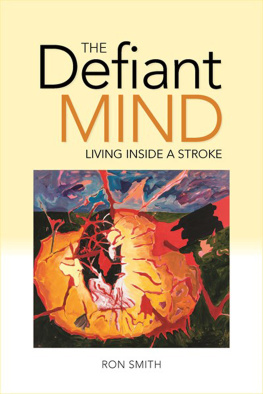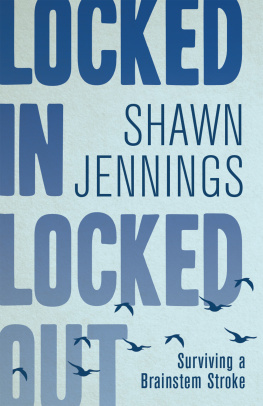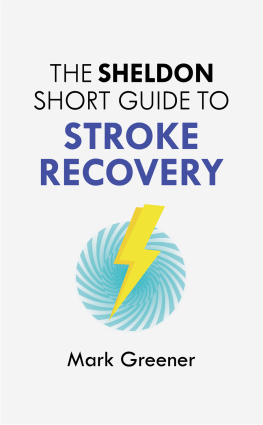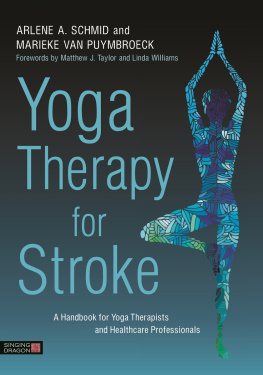Praise for The Defiant Mind
The importance of this superbly written book transcends occupation and knowledge of the disease, and should be read by all. Nearly 25 percent of everyone in Canada will suffer a stroke by the time they reach eighty years old, and almost everyone will be touched by it. This much-needed book fills a void in our literature by expressively taking the reader through the experience of suffering a stroke, which of course includes the physical disability, but also the cognitive, the emotional, and the experiential effects of this disease. The Defiant Mind is a story of survival and the continual path to recovery.
Stroke remains a disease that is misunderstood by most people in our society. The stroke patients that I have interacted with are in need of this type of book to better understand their disease even if their experiences are unique. Furthermore, the general public should welcome this entertaining, emotional and engaging book; it helps us to better understand this disease from the beginning and from the perspective of a patient. Finally, I would highly recommend The Defiant Mind for healthcare professionals and students to better understand the entire scope of this disease and not just the compartmentalized aspects that they are trained to treat, to better understand the variation in care that we provide, and to better understand what it is like to go through our healthcare system.
Noreen Kamal PEng, PhD, Alberta Stroke Program (QuICR)
I thoroughly enjoyed Ron Smiths book. I couldnt put it down. Even without a stroke, his book is an amazing, lucid, literate, informative read. And to think he did this after a debilitating stroke leaves me grasping for superlatives.
Bruce Hunter, author of In the Bears House, Toronto
In The Defiant Mind recovery is a sort of miracle, the literary enterprise even more so. An outstanding read, it is an extraordinary balancing of the various elements of narrative. The shift between the outside reality and the emotional response to the terrible ordeal of stroke takes place with naturalness and total ease. An analytical, dispassionate mind finds its counterpart in a deeply compassionate spirit, and together they converge in a dominant feeling that is love for family, humanity at large, nature a great monument to wholeness.
Ada Donati, poet, translator, art critic, Rome, Italy
I finished reading The Defiant Mind and LOVED IT. Beautifully written by an accomplished writer and now stroke survivor making a clear point that defiance (with unconditional support) is the first step to making hope a reality.
Jean Woo, Heart and Stroke Foundation, Research, Ottawa
The really important feature of Ron Smiths book is that it emphasizes the effect that stroke has on the whole person. Stroke changes your very essence, changing what you can do, how you think and feel, how you experience the world and who you are. Stroke affects your family who become your care-givers. Stroke affects your community. Because there is a modular functional anatomy of the brain, stroke manifestations can be protean depending upon what part of the brain is affected. Stroke treatment is progressing on all fronts acute care, prevention and rehabilitation. Much remains to be learned but there is progress and more stroke patients are having better outcomes every year. We are also making progress on the organization of stroke care. In Canada, we are fortunate to have a health system that does, overall and by comparison to the rest of the world, provide very good stroke care.
Michael D. Hill, MD MSc FRCPC, Calgary Stroke Program, Dept. Clinical Neurosciences, Hotchkiss Brain Institute, Cumming School of Medicine, University of Calgary
Brilliant. The Defiant Mind: Living Inside a Stroke has given me a deeper and more human insight into an area that I have always tried to persuade myself I understood. Not only does this memoir illuminate stroke at a personal level, but it also brings clarity to the essence of health care. Its insights into the culture of our hospitals and services are often awakening and humbling. This book should be required reading for all leaders in health care and for student therapists. The writing is evocative I felt such sadness when I reached the end of the book. Many experiences that are impossible to imagine if you have not suffered a stroke are brought to life. The description of learning to roll in bed and pull oneself up while managing ones paralyzed arm and leg is the best I have read. Similarly, when Ron describes trying to put on his shirt and wheel his wheelchair for the first time, I felt panic and discomfort. And I was often overwhelmed by the vulnerability of disability. But I was heartened when he took over his rehab and became a stronger self-advocate. This is a well-documented account of a stroke experience bundled into a poignant story of life, love, and family.
Pam Aikman Ramsay, Provincial Director, Stroke Services BC, Vancouver
I really enjoyed The Defiant Mind. The book does a remarkable job of drawing attention to the challenges and gaps in the healthcare system while still illuminating the bright spots. It is a clear and eloquent account of a personal stroke story that more than anything else reminds us that behind every stroke is an individual and that every stroke recovery journey is unique.
Stephanie Lawrence, Senior Manager, Communications, Heart and Stroke Foundation, Ottawa
I know this may sound strange, but The Defiant Mind closed a gap for me... it allowed me to understand (and in a way come to peace with) my dads stroke all these years later. I really enjoyed the book... my favourite part was when the authors granddaughter comes back to him. It moved me to see her get closer again, and made me think of when I stopped looking at my dad differently. I dont know if Ron Smith meant for that to be a tipping point in his recovery for his readers, but it definitely was for me.
Elizabeth Takac, Coordinator, Research, Heart and Stroke Foundation
Ron Smith has written a wonderful book about surviving a stroke. The Defiant Mind: Living Inside a Stroke is a MUST READ for stroke survivors, their caregivers, as well as a general audience. Every year, strokes permanently disable five million people worldwide; consequently, how to treat stroke survivors has become a fundamental health issue facing us today.
I honestly thought I knew something about stroke before reading this book. I have a doctorate in Neuroscience from the UCLA Brain Research Center and do research on cardiovascular diseases. I also have experience as a caregiver. Several years ago, when my parents were visiting us, my mother suffered a massive stroke at our house two days after Christmas. Despite her age, she was a very healthy individual with normal blood pressure who kept fit by playing tennis daily. The stroke was completely unexpected and devastating for our family. Although she was hospitalized within an hour of the stroke, she died about one month later. I never gained much insight into her suffering because of her severely debilitated state. Rons book really opened my eyes.
I started reading The Defiant Mind thinking it would confirm what I already knew. Nothing could have been further from the truth. We tend to judge a stroke survivors progress by external factors, such as the gains they make in strength, or their improved ability to walk and speak. But that is only a small part of the story. Here, we have a first-hand account of the perceived inner workings of a brain scrambled by a stroke, trying to make sense of the world around it. The subtle things that those of us on the outside normally miss or think irrelevant, Ron shows to be absolutely crucial.
Rons account of his recovery is fascinating, frustrating and powerful. How his mind goes from being decimated by oxygen deprivation during the stroke to the processes involved in trying to make new neuronal connections to understand the world is illuminating, and told from a perspective that most of us have never imagined. The resurfacing of archival memories in the authors brain from forty to fifty years ago as if they had happened yesterday is truly insightful to me, not only as a scientist but as someone who has cared for a loved one who has experienced a stroke. The frustration of not being able to communicate with family and friends, the challenges the survivor faces in the often long recovery process and the determination it takes to make a strong recovery are compelling. A captivating read, this book helps us better understand stroke from the INSIDE.
Next page







